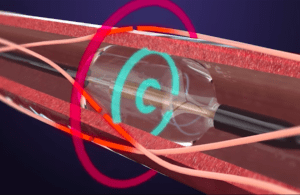
The Radiance II U.S. FDA investigational device exemption (IDE) pivotal trial evaluating the Paradise ultrasound renal denervation (uRDN) system as a treatment for hypertension met its primary efficacy endpoint, demonstrating a statistically significant reduction in daytime ambulatory systolic blood pressure between treatment and a sham procedure measured at two months.
ReCor Medical designed its Paradise platform as a device-based, minimally invasive procedure for treating high blood pressure. The procedure usually takes less than an hour, with the Paradise catheter placed in the renal artery.
The positive results could add to the argument that renal denervation overall is making a comeback as a promising medical technology in the cardiovascular space. It’s been more than eight years since Medtronic announced a major clinical trial had failed to meet its efficacy endpoint. Since the Symplicity HTN-3 study’s failure, Medtronic itself has sought trial designs that clear up confounding factors such as differing medication regimens and patient compliance.
Palo Alto, California–based ReCor Medical’s Radiance II trial, a randomized, sham-controlled trial, enrolled 224 patients with mild-to-moderate uncontrolled hypertension. Enrollees were previously treated with up to two medications and randomized while off medications at more than 60 study centers across eight countries.
Ajay Kirtane, professor of medicine at Columbia University, Vagelos College of Physicians and Surgeons / NewYork-Presbyterian Hospital and Michel Azizi, professor of medicine at Université Paris Cité, Hôpital Européen Georges Pompidou, Paris, France, were principal investigators for the study.
In a news release, Kirtane and Azizi said they were “thrilled to observe these positive results” from the Radiance II study and added that they look forward to being able to present and publish full details from the study “in the near future.”
“We at Otsuka are very pleased with the positive outcome of the Radiance II study,” Otsuka Medical Devices Executive Deputy President Kazumichi Kobayashi said in the release. “With three successful clinical trials of the Paradise uRDN system, we believe even more strongly that the Paradise system can become an important treatment option for patients and physicians struggling to control blood pressure.”
Radiance II represents the third and largest component of ReCor’s Radiance Global Program of randomized and sham-controlled studies for the Paradise uRDN system. The previous two studies, Radiance-HTN Solo and Trio, both met primary effectiveness endpoints.
“ReCor is thrilled that the Radiance II trial met its primary efficacy endpoint. Following the positive Solo and Trio clinical trials, Radiance II adds to the evidence for the Paradise system as a potential future treatment for patients with uncontrolled hypertension,” said ReCor President and CEO Andrew M. Weiss. “We would like to express our gratitude to the principal investigators, steering committee and all investigators for their efforts throughout this important trial.”
Medtronic, meanwhile, is still very much in competition in the space. In May, the medtech giant presented some positive data in May related its Symplicity Spyral RDN system for treating hypertension. ON MED — the company’s major study for the device — continues, with CEO Geoff Martha saying during the medtech giant’s Q4 earnings call in May that completion of the six-month follow-up is expected during the second half of 2022. The plan is to submit for FDA approval if the results are positive.

